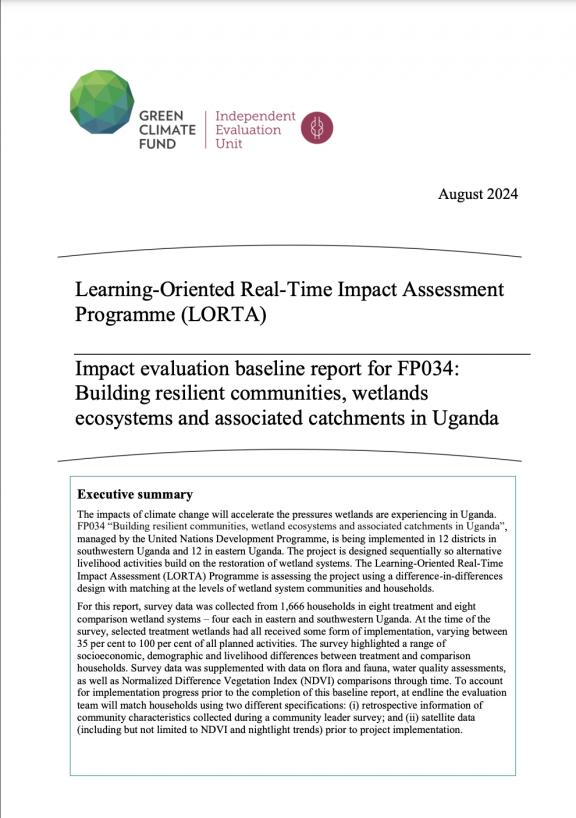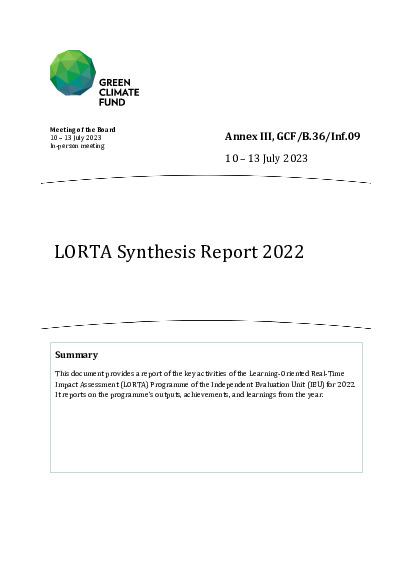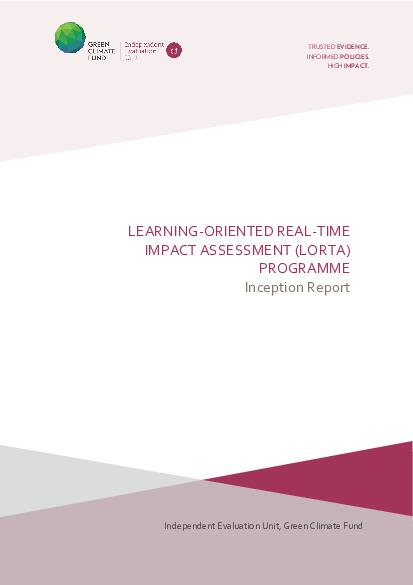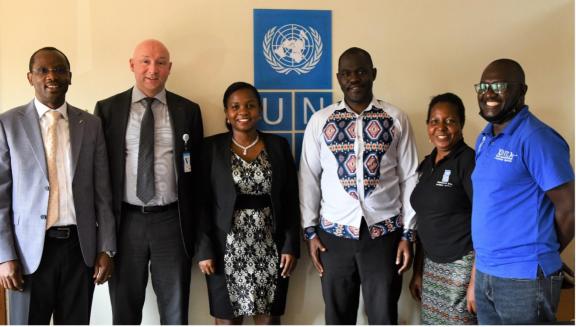FP034
Building Resilient Communities, Wetland Ecosystems and Associated Catchments in Uganda
Building Resilient Communities, Wetland Ecosystems and Associated Catchments in Uganda
This evaluation aims to assess the impact of the "Building Resilient Communities, Wetland Ecosystems and Associated Catchments in Uganda" project (FP034). The impact evaluation focuses on two components of the project. - Component 1: restoration and management of wetland hydrology and associated catchments; and Component 2: improved agricultural practices and alternative livelihood options in the wetland catchments.
-
TopicEcosystem & reforestation
-
Project componentRestore critical wetlands to improve ecosystem services such as ground water recharge, flood control, fishing and agriculture for enhanced livelihoods to the most vulnerable subsistence farming communities. Diversify livelihoods and agriculture to make wetland communities more resilient to climate shocks, by enhancing the skill set of beneficiaries for employability and adaptation.
-
Impact evaluation designDifference-in-Difference (DiD)
-
Target beneficiariesThe project claims to support 800,000 beneficiaries
Timeline
Onboarded to LORTA
Oct 2019
Preliminary Assessment
Mar 2023
Expected date for endline data collection
Sep 2024
One region
- Africa
One country
- Uganda
Reports

Impact evaluation baseline report for FP034: Building resilient communities, wetlands ecosystems and associated catchments in Uganda
25 Feb 2025
This baseline report evaluates FP034, a wetland restoration and community resilience project in Uganda, implemented by the United Nations Development Programme (UNDP). Assessed under the Learning-Oriented Real-Time Impact Assessment (LORTA) Programme, the study uses a difference-in-differences design with matching to measure project impact.

LORTA Synthesis Report 2022
19 Jun 2023
This document provides a report of the key activities of the LORTA Programme for 2022. It is Annex III of a report of the key activities of the Independent Evaluation Unit (IEU) for the period of 1 January to 30 April 2023. It reports on the IEU’s outputs and achievements in line with its Board-approved work plan for 2023.

LORTA Inception Workshop 2018
04 Dec 2018
This report introduces the Learning-Oriented Real-Time Impact Assessment (LORTA) programme, initiated by the Independent Evaluation Unit (IEU) of the Green Climate Fund (GCF). The LORTA programme aims to embed real-time impact evaluations into GCF projects to measure their effectiveness and enhance learning. It includes outcomes from the design workshop held in Bangkok, Thailand, project selection criteria, and an implementation timeline.
Impact
Findings from LORTA's preliminary assessment for FP034 are expected to be released later this year.
To be shared in 2025.
To be shared in 2025.
Details
An estimated 4 million people who live in and around Uganda’s wetlands rely on them for food security. The impact of climate change, coupled with other environmental stresses, is increasing the degradation of wetlands and associated ecosystems. This grant-based project assists the Government of Uganda in taking climate change effects into account in managing wetlands by enhancing the increased resilience of the local ecosystems and communities. The project particularly aims at strengthening the resilience of the wetlands and their sustainable restoration, coupled with alternative livelihood trainings for the population living adjacent to the wetlands.
UNDP Staff in their Uganda Office
LORTA’s impact assessment focuses on evaluating the project’s restoring of critical wetlands to improve ecosystem services and diversifying of livelihoods and agriculture in vulnerable subsistence farming communities.
LORTA's involvement in the evaluation started with a field mission to Uganda in October 2018 led by Dr. Babatunde Abidoye from UNDP. The team engaged closely with key stakeholders of the project, namely the nationally designated authority, the accredited entity, implementing agencies, project staff, and potential end beneficiaries, to ensure their interest, and to facilitate their ownership for the planned theory-based impact evaluation. During the field mission, the team held meetings and capacity-building workshops with the key stakeholders.
Since then, the evaluation and project team worked together to collect all relevant information, particularly the data to map the wetlands, including most relevant ecological characteristics, such as the wetland flora, fauna, water quality, and other biochemical indicators.